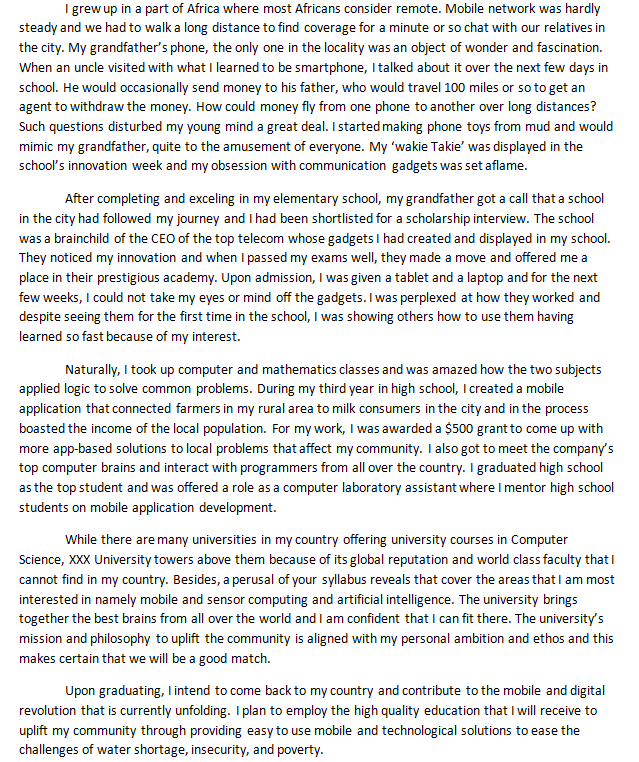Introduction
Most if not all universities will require that you write a statement of purpose (SOP) as one of the requirements to join a program and educational institution. In this article, we will break it down for you by explaining what a SOP is, how to write it, the format, tips to write a successful SOP and samples.
We’re now offering one-on-one expert guidance on how to write a statement of purpose. This is in addition to our reviewing, editing, and standardizing services. Check out our ordering page, fill out the required details and let us help you craft a statement of purpose that will flood your email with admission offers.
phdstatementsofpurpose.com
What’s an Undergraduate Statement of Purpose?
Simply, this is an admission document written to a university expressing interest in a specific program. The document explains to the admission committee about your interest in the field you’re applying to and how it came about. It also details your academic background, goals, career path, and why you and the university are a good match for each other.
Most universities require that a statement of purpose is submitted in the form of an essay typed in Ms. Word format or saved in PDF. Others may however have different format requirements, for instance a question-based approach in which you respond to questions on the application portal and save.
Why is an Undergraduate Statement of Purpose Important?
- A statement of purpose is an integral part of applying for a place in the university
- A SOP helps the admission panel to make a decision whether to offer you a place or not
- It introduces you to the admission panel
- It explains your goals, plans, and vision and hence help the admission panel assess your suitability
- It’s a pitch to the admission committee (why you and the university are a good match)
- If you’ve a weak academic profile, for example poor GPA, a SOP can help you explain it. Your goals and vision should help to compensate for this weakness
- Some universities use SOP to assess your ability to express your thoughts and ideas through writing
What to Include in an Undergraduate Statement of Purpose
This may vary depending on whether the university has specific requirements on how you should write your SOP, or not. The first step should be therefore to check with your prospective university. Check their ‘admission requirements’ page and if they’ve specified how to draft your SOP, follow it to the letter.
If you’re following the universal format, you should include the following in your undergraduate statement of purpose:
- Personal background
- Academic background-Grades
- Experience-if you’ve leadership, innovation, or entrepreneurship experience, capture it well
- Extra-curricular activities
- Short and long term goals
- Volunteer or professional experience
- Reasons for your interest in the field of study
- Reasons for your interest in the university
- If you’re applying to study in a foreign country, explain your reason
- Interests and hobbies
- Financial background
Format of an Undergraduate SOP
The table below represents a general format of a statement of purpose for undergraduate.
| 1st paragraph | Introduce yourself Explain how your interest in the field of study came about Explain your expectations from the course Explain your intentions after completing the course |
| 2nd paragraph | Explain the inspiration behind your choice of the particular program Explain the reason to study in the university If you’re applying to study in a foreign country, provide an explanation |
| 3rd paragraph | Explain past experience Explain academic record/volunteer or professional experience Bring out notable achievements such as certificates, awards |
| 4th paragraph | Provide information about your personality Talk about your interests and hobbies while aligning them to your suitability for the program and university |
| 5th paragraph | Conclude by reiterating your goals, strengths, and suitability for the program |
Steps for Writing a Successful Undergraduate Statement of Purpose
We’ve previously outlined how to write an impressive Statement of Purpose. These steps can be summed up as follows:
Plan
Whether it’s an Academic CV, Personal Statement, or any other admission document, you must plan well when writing it.
- Brainstorm about what you want to write
- Create an outline
- Create pointers showing your achievements, experience, academic awards etc
- Think about the reasons that attracted you to the program/university
- Think about the hook that you’ll use to grab the admission committee’s attention
Create a Draft
Draft a rough copy of your statement of purpose. Write about all your experiences, awards, goals, and vision. Avoid jargon or technical words and write in formal, active voice. Start with the most recent achievements/experiences going back. Remember to have an introduction and conclusion.
Edit/Review/Standardize
Your Statement of Purpose should be perfect. Read and re-read for flow. Check that the grammar is on point.
It’s always great to have an admission expert review, standardize, or customize your statement of purpose. Get expert help
Tips to Write a Successful Statement of Purpose
- Tailor your SOP to the program-avoid generic information
- Blow your own trumpet-A SOP is no place to be modest
- Don’t copy your SOP-plagiarism is ground for disqualification
- Start your SOP with “a hook” to grab the admission committee’s attention
- Be concise-follow specified word limit
- Avoid jargons or technical terms
- Avoid jokes or flattery language
- Explain that the program/university was your first choice
Samples of Successful Undergraduate Statements of Purpose
Statement of Purpose Sample for Cognitive Science
The sample below shows a sample of an undergraduate statement of purpose for undergraduate studies in cognitive science.

Statement of Purpose Sample for Computer Science
This sample is an undergraduate statement of purpose for Computer Science.

Final Call
It’s always recommendable to have someone go through your SoP before you submit it.
A friend or a family member can help to tell whether you’ve represented yourself credibly and compellingly enough.
A professor or a faculty member may also help to tell whether you’ve captured your academic and research background well enough and connected them to your research interests and suitability for the program.
At phdstatementsofpurpose.com, we are that friend and faculty member.
After reviewing thousands of SoPs and personal statements, we can tell a good from a not so good SoP, and a good one from a great one.
We’ve internalized the structure and language of writing SoPs and with our team of experts; we’ll sit down and dissect your draft.
We’ll point out areas of strengths and weaknesses and propose how to structure and express your SoP better.
We’ll give intense and detailed feedback so that you express your thoughts with clarity and bring out your uniqueness.
We’ll ensure that the final product is delivered in time, is logical and coherent, intellectual, and polished.
Tell us which aspect of your SoP writing you’re struggling with:
How to start?
How to conclude?
Written your SoP but you’re unsure whether it meets high enough standards?
Check out our PACKAGES and get in touch.
Other Highly Rated Samples
- Statement of Purpose Sample for MBA (Ivy school)
- Statement of Purpose Sample for Business Management
- Statement of Purpose Sample for Mathematics
- Statement of Purpose Sample for Nursing (Ph.D)
- Statement of Purpose Sample for MBA
- Statement of Purpose Sample for MBA with Engineering Background
- Statement of Purpose Sample for Masters in Psychology
- Statement of Purpose Sample for Masters in Public Health
- Statement of Purpose Sample for computer science 2
Frequently Asked Questions about Undergraduate Statements of Purpose
Do I have to write an undergraduate SOP?
An undergraduate SOP is a requirement for most if not all universities
How do I structure my undergraduate SOP?
- Introduction-Start with a hook and explain how your passion in the field came about
- Body-Explain your academic and professional background, career goals, suitability for the program/university, hobbies and interests.
- Conclusion-reiterate your goals and connect them to how the program will help you.
How do I write a SOP if I don’t have experience?
At undergraduate level, you’re not expected to have amassed much teaching, volunteer, or professional experience. However, if you’ve helped in the family business, bring it out. If you intend to pursue a course in a field where you did not excel well, follow this guide.
How long should be my Statement of Purpose?
The standard length is typically 600-1000 words but this may vary from university to university
What language and style should I use in my SOP?
Use standard formal English that’s neither technical nor informal
Can I start my SOP with a hook?
Yes. That will help grab the attention of the admission committee
What’s the difference between Undergraduate Statement of Purpose and Graduate SOP?
The difference is that a Graduate SOP is written for masters or Ph. D program and therefore focuses more on academic, research, professional, and teaching experience. A graduate SOP also focuses more on publications. On the contrary, a SOP for undergraduate focus more on academic background. There is cognizance that an applicant for undergraduate studies hasn’t done much academic research. The aim is therefore to show that you have the mental acuity to ace your program, your career goals or plan, and your suitability for the program and university.
Is a SOP the same as a personal statement?
As the name suggests, a personal statement is a bit more personal and informal. On the other hand, a SOP is formal and more detailed.
I have written my undergraduate statement. Can I get someone to edit and review it?
It’s always important to seek a second opinion no matter how confident you’re about your SOP. Our professional admission counselors customize, edit, review, and standardize your Statement of Purpose so that it stands out. Click here to get in touch.
[learn_press_profile]

